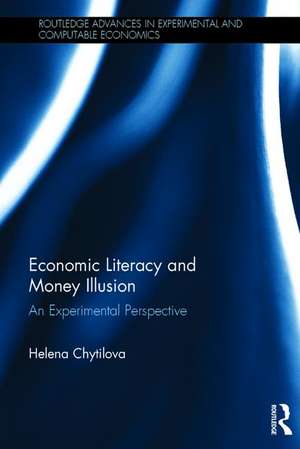Economic Literacy and Money Illusion: An Experimental Perspective: Routledge Advances in Experimental and Computable Economics
Autor Helena Chytilovaen Limba Engleză Hardback – 6 iul 2017
Economic Literacy and Money Illusion will be of interest to the general audience and to those who are interested in behavioral economics, economics education, and experimental economics, as well as to policy makers and institutions. Last but not least, it will help develop students’ interest in alternative economic theories.
NB. The research and writing of this book was made possible with the support of the University of Economics, Prague, Faculty of Economics, Department of Economics.
| Toate formatele și edițiile | Preț | Express |
|---|---|---|
| Paperback (1) | 385.84 lei 6-8 săpt. | |
| Taylor & Francis – 14 aug 2020 | 385.84 lei 6-8 săpt. | |
| Hardback (1) | 763.39 lei 6-8 săpt. | |
| Taylor & Francis – 6 iul 2017 | 763.39 lei 6-8 săpt. |
Preț: 763.39 lei
Preț vechi: 1026.94 lei
-26% Nou
Puncte Express: 1145
Preț estimativ în valută:
146.07€ • 152.51$ • 120.89£
146.07€ • 152.51$ • 120.89£
Carte tipărită la comandă
Livrare economică 04-18 aprilie
Preluare comenzi: 021 569.72.76
Specificații
ISBN-13: 9781138235571
ISBN-10: 1138235571
Pagini: 200
Ilustrații: 12 Line drawings, black and white; 8 Tables, black and white; 12 Illustrations, black and white
Dimensiuni: 156 x 234 x 17 mm
Greutate: 0.41 kg
Ediția:1
Editura: Taylor & Francis
Colecția Routledge
Seria Routledge Advances in Experimental and Computable Economics
Locul publicării:Oxford, United Kingdom
ISBN-10: 1138235571
Pagini: 200
Ilustrații: 12 Line drawings, black and white; 8 Tables, black and white; 12 Illustrations, black and white
Dimensiuni: 156 x 234 x 17 mm
Greutate: 0.41 kg
Ediția:1
Editura: Taylor & Francis
Colecția Routledge
Seria Routledge Advances in Experimental and Computable Economics
Locul publicării:Oxford, United Kingdom
Public țintă
Postgraduate and UndergraduateCuprins
List of figures
List of tables
Introduction
1 Early theorizing about money illusion
2 Rejection of money illusion
3 Renewal of interest in money illusion
4 The money illusion and its applications
5 Economic literacy and money illusion
6 Economic literacy and money illusion: An experimental approach
7 Experimental results
Index
List of tables
Introduction
1 Early theorizing about money illusion
2 Rejection of money illusion
3 Renewal of interest in money illusion
4 The money illusion and its applications
5 Economic literacy and money illusion
6 Economic literacy and money illusion: An experimental approach
7 Experimental results
Index
Recenzii
'Money illusion has been a non-starter among academic economists for a long time. It has been thoroughly banned from the economists’ research agenda with the advent of the rational expectations revolution in the 1970s. Back then, it was a matter of principle to account for all economic phenomena, including macroeconomic ones, by assuming that all agents are fully rational and that all agents know that everyone else is fully rational. Fortunately, those days are over in most quarters of the profession. With the emergence of behavioral and experimental economics as a field in the last two or three decades, economists have started to rediscover their fascination with the topic and have started asking systematically when money illusion matters, and if so, why.
Helena Chytilova’s timely book recounts the remarkable academic journey of the concept of money illusion and she contributes to a currently hot topic in research by taking stock of the relevant literature in this emerging field. Importantly, she provides new experimental evidence suggesting that money illusion matters for nominal inertia even if the decision makers involved are economically literate, i.e. have undergone solid training in economics. This finding is intriguing as it seems to imply that economic training alone will not necessarily be a safeguard against the economic harm potentially caused by money illusion.' — Jean-Robert Tyran, Professor of Economics, University of Vienna, Austria
Helena Chytilova’s timely book recounts the remarkable academic journey of the concept of money illusion and she contributes to a currently hot topic in research by taking stock of the relevant literature in this emerging field. Importantly, she provides new experimental evidence suggesting that money illusion matters for nominal inertia even if the decision makers involved are economically literate, i.e. have undergone solid training in economics. This finding is intriguing as it seems to imply that economic training alone will not necessarily be a safeguard against the economic harm potentially caused by money illusion.' — Jean-Robert Tyran, Professor of Economics, University of Vienna, Austria
Descriere
Money illusion has long been over-looked in explanations of business cycles. However, with increased questions over the basis of the rational model, money illusion has been attracting renewed interest. This book follows the latest research and asks whether the acquisition of economic education can help to weaken the effects of money illusion.










